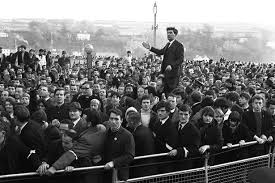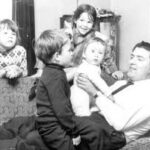John Hume R.I.P.
The funeral of John Hume took place at St. Eugene’s Cathedral in Derry today.
Five years ago, I was invited to speak in Derry, at St. Eugene’s, on human rights and the right to life
Although John was already suffering from dementia, his wife, Pat, brought him to the event. It was a poignant moment for me.
During my years in the House of Commons we had sat together on the Opposition benches – with his Social Democratic and Labour Party (SDLP) colleagues – Seamus Mallon, Dr. Joe Hendron and Eddie McGrady, sitting behind the Liberal bench and in front of the Northern Irish Unionist bench.
As well as physical proximity little else separated us.
During my time as Northern Ireland Spokesman it was always wise to hear what John had to say before offering my own opinion.
His outlook on life was fashioned by a classic belief in the Common Good (partly formed when he tested a vocation in Maynooth seminary) and a passion – fashioned on the streets of Derry – for the underdog, a loathing of rank discrimination, a commitment to economic and social justice, and a passionate belief in finding peaceful solutions to seemingly intractable challenges.

Always standing firmly between two extremes he was no wishy-washy centrist – and took his radical beliefs onto the high ground rather than the centre ground.
He said no to the rabid populism that justified laying bombs, the shooting of innocent people, the scapegoating of the “other”, and the rabble rousing and playing to the crowd which informed so much of Northern Ireland’s politics.
His wife, Pat, says that when, in 2018, the twentieth anniversary of the Good Friday Agreement – of which he was a principal architect – was celebrated he could not remember the role he had played.
Yet, for those of us, still at school when fifty years earlier, in 1968, John led the civil rights protests in Northern Ireland (when he was arrested by a Royal Marine called Paddy Ashdown), we will not quickly forget the remarkable achievements of this Nobel Peace Prize winner.
He attracted many of us into political life, knowing that we had to find political solutions and answers to deep seated injustices- and that cycles of revenge killings were not the answer.
We will not quickly forget the role he played in providing a counterpoint to paramilitary violence, in opposing narrow minded bigotry and sectarianism, in championing cross community reconciliation and devolved government, and in giving politicians a good name.
Nor should his SDLP or the people of Northern Ireland forget the authentic values for which he stood and, in forming tomorrow’s citizens, offer his life as a role model for a rising generation who could otherwise be so easily recruited by the forces which he opposed throughout his life.
May he rest in peace.



